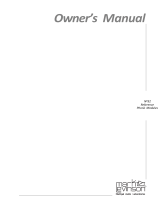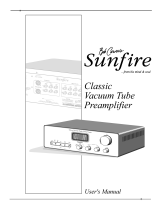Congratulations on your purchase of the Audio Note (UK) M3 RIAA phono stage.
It has been specifically engineered for sonic performance rather than technical
specification, and fulfills all Audio Note (UK) Level 3 criteria: -
Pure Class A operation
Zero negative feedback
Single Ended circuit topology
Valve rectification
Materials and component quality
It is well known that the accurate reproduction of music, not just sound, requires the
purity of the incoming signal to be preserved. It is therefore not difficult to conclude
that, in order to achieve this goal and to retain the musicality of the original
performance, the complexity of the circuitry itself must be kept to a minimum.
In response to this, the M3 RIAA phono stage uses a single-ended, zero feedback
circuit topology. This is simply the most linear design possible, demanding pure
Class A valve operation and removing the need for a phase splitter, which introduces
unnecessary crossover distortion.
In contrast to the majority of the audio industry, we design our circuits with the aim of
minimising non-harmonic and time base anomalies, rather than producing
vanishingly small harmonic or low intermodulation distortion measurements. These
non-harmonic amplitude and time base distortions have a highly perceptible and
adverse affect on the signal waveform, and it is far more important to address these
factors than participate in the increasingly irrelevant numbers game that chases
‘perfect measured response’.
As a result, the M3 RIAA phono stage was designed for maximum linearity and
minimum transient distortion, and avoids the need for detrimental ‘corrective’
measures, such as inherently error-prone feedback loops.
At the heart of the M3 RIAA is an exceptionally fine Moving Magnet phonostage
which uses three 5670 valves. This is followed by a 5687 valve equipped line stage,
and both sections are powered by their own dedicated 6X5 valve rectified power
supply based on the M10’s Galahad PSU. These power supplies also incorporate an
ECL82 for voltage regulation and a 5651 as a voltage stabilizer. Audio Note (UK)
Copper wiring, a mix of Beyshlag and AN(UK) tantalum resistors, SILMIC capacitors
and Audio Note (UK) copper foil signal capacitors are used throughout the circuit,
along with in-house designed and manufactured, custom Audio Note (UK) output
transformers which feature I-E M4 cores and copper windings. The M3 RIAA also
has a correctly designed and implemented balanced output circuit.
















